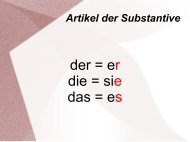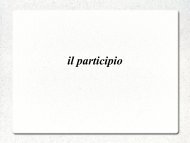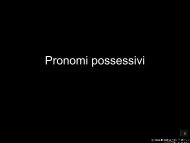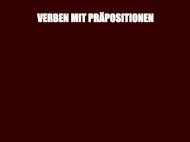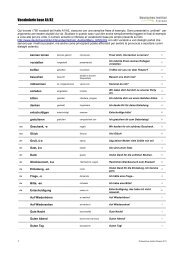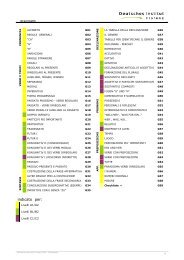Inhaltsverzeichnis - Deutsches Institut Florenz
Inhaltsverzeichnis - Deutsches Institut Florenz
Inhaltsverzeichnis - Deutsches Institut Florenz
Create successful ePaper yourself
Turn your PDF publications into a flip-book with our unique Google optimized e-Paper software.
Grammatik A<br />
FORMA PROGRESSIVA<br />
Per esprimere il gerundio, la forma progressiva "sto facendo - in questo momento", si ricorre<br />
ad un avverbio, ovvero "gerade" che si mette immediatamente dopo il<br />
verbo coniugato:<br />
Ich telefoniere gerade mit Klaus<br />
Ich kann jetzt nicht ans Telefon, ich koche gerade!<br />
Was machst du gerade?Passato prossimo -<br />
VERBI REGOLARI PASSATO (PROSSIMO)_PERFEKT<br />
ge……t<br />
ge mach t fatto Nella lingua parlata si usa quasi esclusivamente<br />
il "Perfekt" per esprimere qualsiasi tempo del<br />
ge arbeite t lavorato passato. L'uso del "Präteritum" è limitato ai verbi<br />
ge sag t detto<br />
"sein","haben" e ai verbi modali .<br />
Il "Perfekt" si forma con l'ausiliare "haben" e il<br />
ge frag t chiesto<br />
participio passato (posizionato in fondo alla<br />
frase):<br />
ge spiel t giocato<br />
"Ich habe meine Hausaufgaben nicht<br />
gemacht". Solo i verbi di moto, che sono quasi<br />
an ge mach t acceso<br />
tutti irregolari, formano il perfekt con "sein".<br />
aus ge stell t spento<br />
mit ge mach t partecipato<br />
be stell t ordinato<br />
zer stör t distrutto<br />
ver leg t perso<br />
er zähl t raccontato<br />
- studier t sudiato<br />
I verbi regolari separabili che iniziano con le<br />
preposizioni<br />
an, ein, mit, aus, auf, vor, zu, bei, unter,<br />
gegenüber, über, nach, ab, zwischen,<br />
formano il participio con "ge".<br />
I verbi regolari inseparabili che iniziano con<br />
ver, be, er, ent, emp, wider, zer, miss,<br />
formano il participio senza "ge".<br />
Anche i verbi in "ieren" formano il participio<br />
senza "ge"<br />
Tipps und Tricks: Conviene studiare molto attentamente i participi dei verbi, perché questi non servono<br />
soltanto per esprimere il passato, ma anche per la costruzione del passivo e si usano<br />
altresì come attributi dei sostantivi: “l’uovo bollito”, “das gekochte Ei”.<br />
I verbi più usati sono di solito irregolari e quando ne studiate i participi, studiate dei verbi<br />
utilissimi perché di uso molto frequente.<br />
© <strong>Deutsches</strong> <strong>Institut</strong> <strong>Florenz</strong> 2011 Grammatik_A 9




